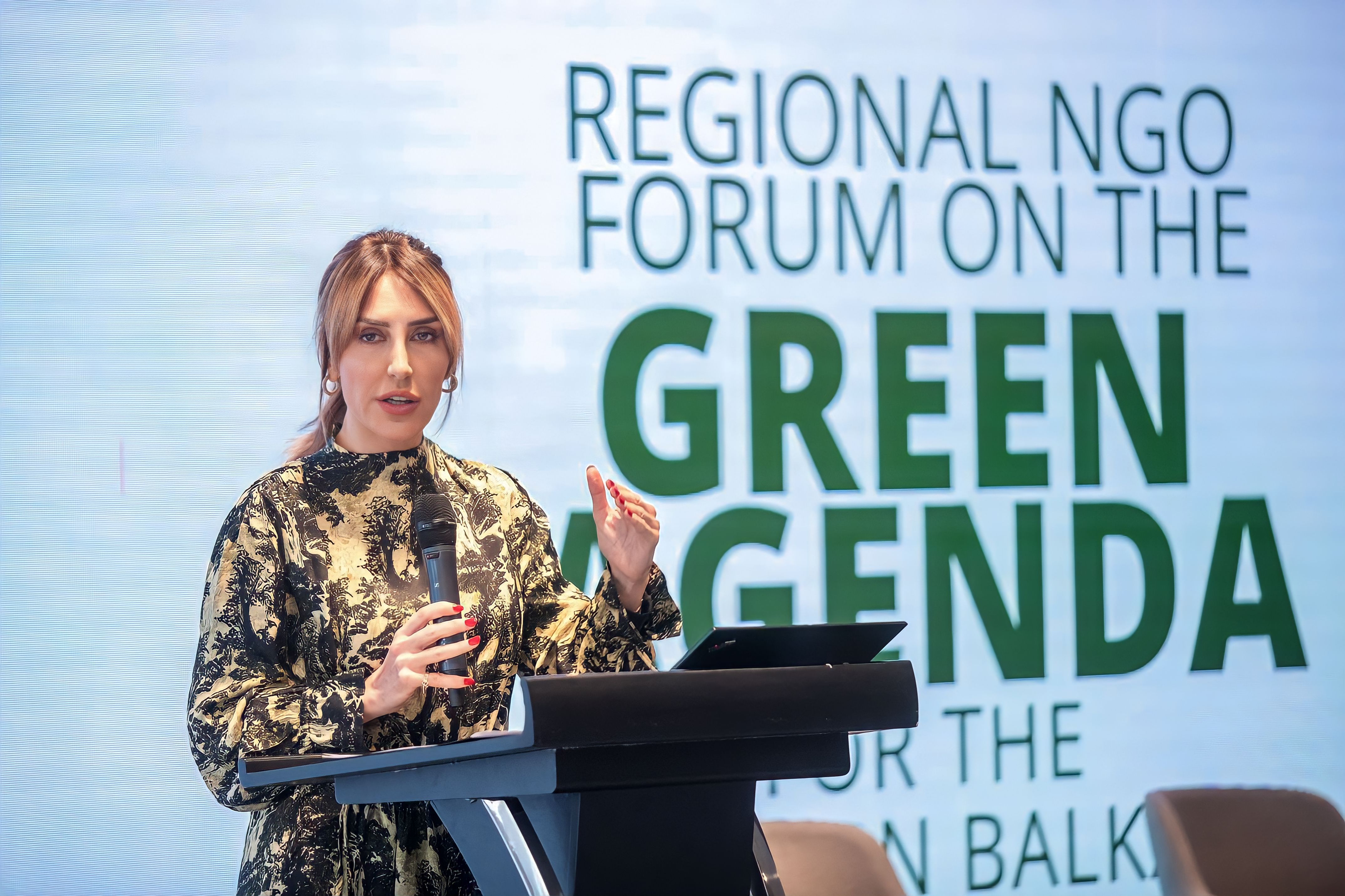RCC organised NGO forum on the Green Agenda for the Western Balkans together with EU4Green Bregu: Our region should remain steadfast on the sustainable, green transition and decarbonisation path
30 March 2023

RCC Secretary General Majlinda Bregu opening the NGO Forum on Green Agenda for the Western Balkans (Photo: RCC/Nemanja Brankovic)
“The Green Agenda for the Western Balkans is a dynamic and evolving initiative that, like a living organism, requires collective efforts of both the governmental and non-governmental sectors to nurture, grow and shape towards a sustainable plan for the future. In a developing region, such as ours, the concerns are related to daily life, and this makes it more difficult to think about the form and ways the future is threatened. The future with all its colours of uncertainty seems distant when daily perspective is still challenging. Our region should remain steadfast on the sustainable, green transition and decarbonisation path as any long-term derails are detrimental, especially in such a climate change-vulnerable region like ours,” said Majlinda Bregu, Secretary General of the Regional Cooperation Council (RCC), opening the NGO forum on the Green Agenda for the Western Balkans, organized by the RCC in cooperation with EU4Green in Belgrade today.
The Forum participants discusses the pressing environmental issues including sustainable mobility, energy efficiency, greening of investments and jobs, to support engagement and enhance the role of civil society, but also deliberate the regional and individual progress of the Green Agenda Action Plan implementation across the Western Balkans.
“Though maybe not seen with the same level of urgency and not yet a politically salient issue in the WB, climate change and environmental degradation are an existential threat and need as swift resolve as the energy, inflationary, food crises. Politicians can take serious note of the growing number of youth citing broader quality of life and environmental reasons informing their decisions to leave the region.” added Bregu.
RCC Secretary General opened the Forum together with Holger Schroeder, Head of Unit of the Western Balkans Regional Programmes and Economic Investment Plan, DG NEAR and Azra Vukovic, Green Home, nongovernmental organisation from Montenegro.
“We are immensely grateful for this regional “Coalition of the Willing” we have gathered here. On the side of RCC, we are proud to put in full motion our regional convening capacity both among the governments and international organizations in launching today’s platform for dialogue and collaboration. As the proverb by an unknown author says, “When spiders unite, they can tie down a lion.” So let’s start the web to tie this environmental lion together, and go green,” concluded Bregu.
The forum gathered nearly 60 representatives of civil society organisations and coalitions and close to 20 representatives of donor community and international organisations, including representatives of governments from the region. Fruitful discussions covering major topics on the implementation of the GAWB collected valuable input and reflections from a diverse list of CSOs on the key challenges and progress on the implementation of the Agenda so far.
More on Green Agenda for the Western Balkans - Regional Cooperation Council | Green Agenda for the Western Balkans (rcc.int)
***
The Green Agenda for the Western Balkan (GAWB) has been endorsed by the regions’s leader at the Summit in Sofia in 2020. The GAWB Action Plan has been adopted at the Brdo Summit in October 2021. The RCC has coordinated the process of drafting the GAWB Declaration and Action Plan. The main goal of the GAWB is to achieve carbon neutrality by 2050 and align with the European Green Deal’s key elements. In order to facilitate the steering of the GAWB Action Plan and to enable a well-informed decision-making process, the RCC ensures and maintains a platform for dialogue with the European Commission services, relevant regional organisations that have activities or mandates in relevant policy areas in the Western Balkan region, international financial institutions, various socio-economic partners, non-governmental organisations, academia and the scientific community.
The objective of EU4GREEN is to support the Western Balkan economies in implementing the Green Agenda, the EU's regional strategic roadmap against the climate crisis, and to initiate the necessary reforms. EU4GREEN recognizes and supports the importance of the involvement of civil society organizations in the implementation process.



